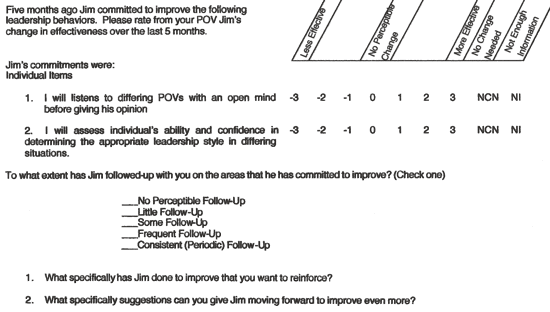We only get paid if positive, measurable change occurs.
Neither the person being coached nor the coach determines improvement. The degree of improvement is determined by the stakeholders/raters on the two mini surveys over the course of the year (12 months).
We are engaged to work with successful high potential individuals, executives and leaders who want to get even better. These are people who are committed to their success as well as the success of their companies and organizations. They are seen as highly intelligent and as individuals with high personal integrity who are persistent in achieving their goals. Intellectually, they realize that some leadership behaviors associated with their success in the past may not be the behaviors that are needed to achieve success in the future.
Most of us can see behavioral change that others should make. We can even make suggestions that we believe if acted on, would help others improve. If we are that perceptive of others, why is it so hard for us to see specific changes we, ourselves should make? In fact, even if we see a change we should make, we often have difficulty in making the change. As we become more successful, it seems even harder to make these changes. And, when things are going well, we may see no reason to change.
In our work, we focus on helping successful people achieve a positive, measurable, long-term change in leadership behaviors. Some of the steps in our unique coaching process are:
1. The person receives 360 feedback by self-selected raters (stakeholders).
Successful people have a high need for self-determination. Ultimately, therefore, ownership of the behavioral change process will have to come from the people who are changing their own behavior and not from an internal or external coach. Successful people are responsive to help in achieving goals that they have set. They tend to resist changes that make them feel "judged" or "manipulated".
Successful people also have a desire for internal consistency. If they publicly state that certain behavior is important, they will be more likely to strive to be a positive role model in demonstrating this behavior.
In most cases, understanding what behaviors need improvement will not be their major challenge. Their major challenge will be demonstrating these behavior changes.
When successful people respect the source of the feedback, they are much more likely to learn and change. They will almost always respond constructively to feedback when they are involved in selecting the behaviors and selecting the stakeholders. By making the stakeholder feedback anonymous, people tend to focus on what they need to improve and not who did the rating. It is hard to deny the validity of items that we say are important as evaluated by stakeholders whom we respect!
2. After receiving 360 feedback, the person selects one or two Important leadership behaviors to improve.
Many of the successful people that we coach are extremely busy. Historically, a main reason that people do not "stick with" their change plan is over-commitment. They don't need another "laundry list" of goals. Therefore, we suggest that two should be the maximum number of leadership behaviors to focus on improving. In fact, changing just one high-leverage behavior (most impact) will create a significant difference.
If successful people see the connection between their behavioral change goals and their personal goals, they are more likely to change. And, if the people we are approaching see the connection between changing behavior, achieving their vision, and living their values, they will be even more committed to 'do what it takes' to achieve lasting change.
3. The person involves respected colleagues in the behavioral change process.
Ongoing involvement from supportive colleagues (stakeholders/raters) is almost always associated with positive behavioral change. Colleagues are much more likely to help if they feel that they are respected and that their advice is requested (as opposed to expected).
Successful people respond well to getting ideas and suggestions for the future that are aimed at helping them achieve their goals. When they feel they are being encouraged and supported by the people around them, they will be much more likely to "stick with it" and achieve positive, long-term behavioral change. If they feel they are being judged or manipulated, they will tend to become hostile to the process and quit trying.
Therefore, we teach successful leaders to have involvement conversations with each colleague during which they:
1) Thank each colleague for his/her feedback and express gratitude;
2) Inform each colleague of the 1 or 2 targeted leadership behaviors and why they are important;
3) Ask each colleague to help by providing constructive, future-oriented suggestions;
4) Recruit the respected colleague to provide ongoing suggestions to help them improve. |
And, we establish these ground rules for colleagues (raters / stakeholders):
A) Provide helpful suggestions* and avoid being cynics, critics, or judges.
B) 'Let go' of the past and focus on the future. |
*Not all suggestions are implemented (leadership is not a popularity contest). However, well-intended and constructive suggestions for the future are always appreciated. A key function of the coach is to help the person being coached develop an action based on stakeholder suggestions.
Findings on the usefulness of this process are clear. When successful people write down behavior change goals, announce these goals to respected colleagues, and involve the colleagues in helping them improve, positive measurable change is much more likely to occur.
4. Develop a follow-up process that provides an opportunity for ongoing dialogue on selected behaviors with selected stakeholders.
Our research on feedback and follow-up has clearly shown that leaders are much more likely to achieve a positive, measurable, sustainable change in behavior if they consistently involve selected colleagues (through follow-up dialogues) in the change process. These follow-up dialogues are very focused and need take only a few minutes (very time efficient).
When stakeholders/raters are trained to be supportive, the follow-up process provides an ongoing opportunity for constructive feedback, recognition, and most importantly feedforward (suggestions). It reinforces the individual's public commitment to change. Ongoing dialogue creates a process in which both parties are focused on improving performance and the relationship, not on judging each other.
5. Conduct mini surveys at the 5 and 11-month mark.
Mini-surveys are a simple and efficient way to measure behavioral change. Mini-surveys are very short and focus only on the selected leadership behavior(s) that has/have been selected by the person being coached. They are designed so that the raters evaluate behavior that occurs only during the coaching period. They focus on the stakeholder's/rater's perception of the individual's improvement - not their effort. Below is a sample of a mini-survey.
Sample Mini-Survey

After receiving the mini-survey results the individual thanks the raters, involves them in future change and continues the process. This is almost always a positive experience for the individual and for the raters/co-workers. When done consistently well, the positive change is seen quickly, builds momentum, and is sustained.
In summary, helping successful people change a couple key leadership behaviors is both an opportunity and a challenge. Our "before-and-after" research has taught us a great lesson—successful people will not change behavior simply as a result of attending a course or seminar. They get better because of their efforts and the efforts of their respected stakeholders/raters.
Therefore, in our unique coaching process, we work with the individuals we are coaching AND their colleagues (stakeholders/raters). Both are actively engaged, and both benefit from the process. Our unique coaching process is a true systems approach to behavior change and performance improvement.
Our unique value proposition
We only get paid if positive, measurable change occurs.
Neither the person being coached nor the coach determines improvement. The degree of improvement is determined by the stakeholders/raters on the two mini surveys over the course of the year (12 months).
|









